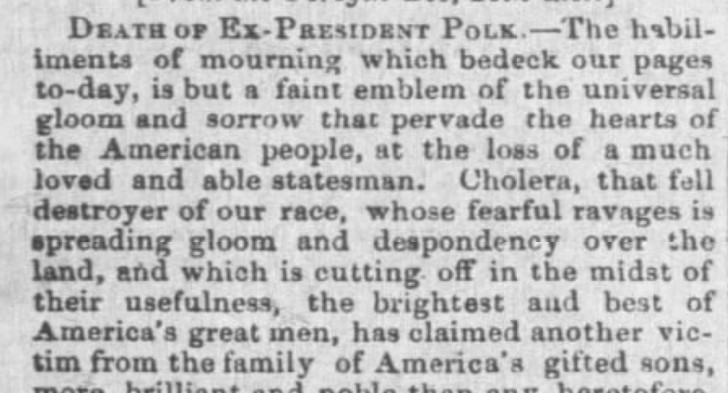Today is the anniversary of the day in 1849 that President James K. Polk died just months after leaving office. He was the shortest-lived ex-president of all. And it was a pandemic that killed him.
It’s worth noting that Polk was only 53 when he left office. He’d been the youngest president ever at the time, but he’d run himself ragged in office, sometimes running the entire executive branch by himself, or only with help from First Lady Sarah Polk. The before/after photos are striking:
Polk was only 53 when he left office. He'd been the youngest president ever at the time, but he'd run himself ragged in office, sometimes running the entire executive branch by himself, or only with help from First Lady Sarah Polk. The before/after photos are striking: pic.twitter.com/rGp8G9CsS8
— Brady Carlson (@BradyCarlson) June 15, 2020
The Polks had a house waiting for them in Nashville, which they named Polk Place. They were going to finally get some rest. But they had numerous stops to make on the way back from D.C. Friends, allies and well-wishers were organizing elaborate parties & dinners for them.

Note the stop in New Orleans. Polk, who was already suffering from a bad cold he’d picked up during the “dusty and fatiguing” tour, was now entering a city where cholera had been spreading.

Polk had hoped to zip through town and get back to Nashville, but the locals insisted he attend the massive dinner they’d planned for him, and he agreed.

We don’t know for sure where Polk got sick, but a public reception with lots of handshaking couldn’t have helped. And when I say Polk got sick, I mean he got sick. “My bowels were affected,” he told the doctor, and the shaking of the Boat had become inconvenient for me.” A doctor in Paducah somehow told Polk, who exhibited all the signs of cholera, that he didn’t have cholera. The Polks made it back to Nashville, but he was still quite ill. Newspapers ran updates on his condition, fully expecting him to pull through.

But his condition deteriorated. By June 1849 Polk knew the end was near; he called for a preacher to baptize him, and his mother raced in from Columbia to see him one last time.

His last reported words, 103 days out of office, were to his wife: “I love you, Sarah, for all eternity, I love you.” Nashville put him with 32 other cholera victims in a temporary grave. He stayed there for nearly a year, until his permanent tomb was ready. Sarah Polk survived her husband for decades; in fact, Polk Place was an oddity in the Civil War, as both Union and Confederate officials would call on her. She died in 1891; Polk Place would be demolished in 1901.

The Polks are currently buried on the grounds of the Tennessee State Capitol, not far from where Polk Place once stood, but the efforts continue to move them to the grounds of the Polk Family Home in Columbia, Tennessee, which is now a museum.
And that’s the story of how a pandemic killed the 11th president of the United States. Be kind, read history, and wash your hands.

